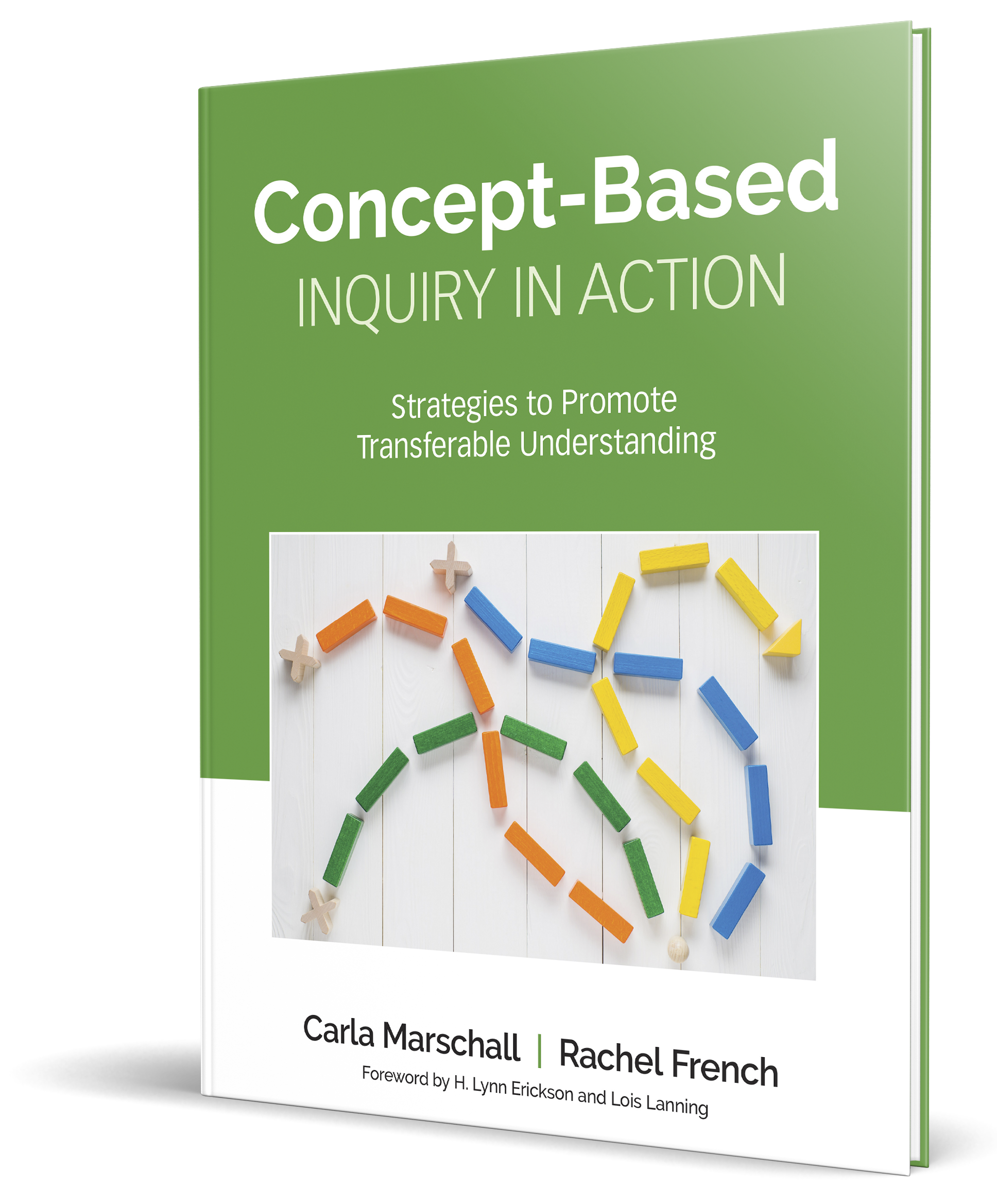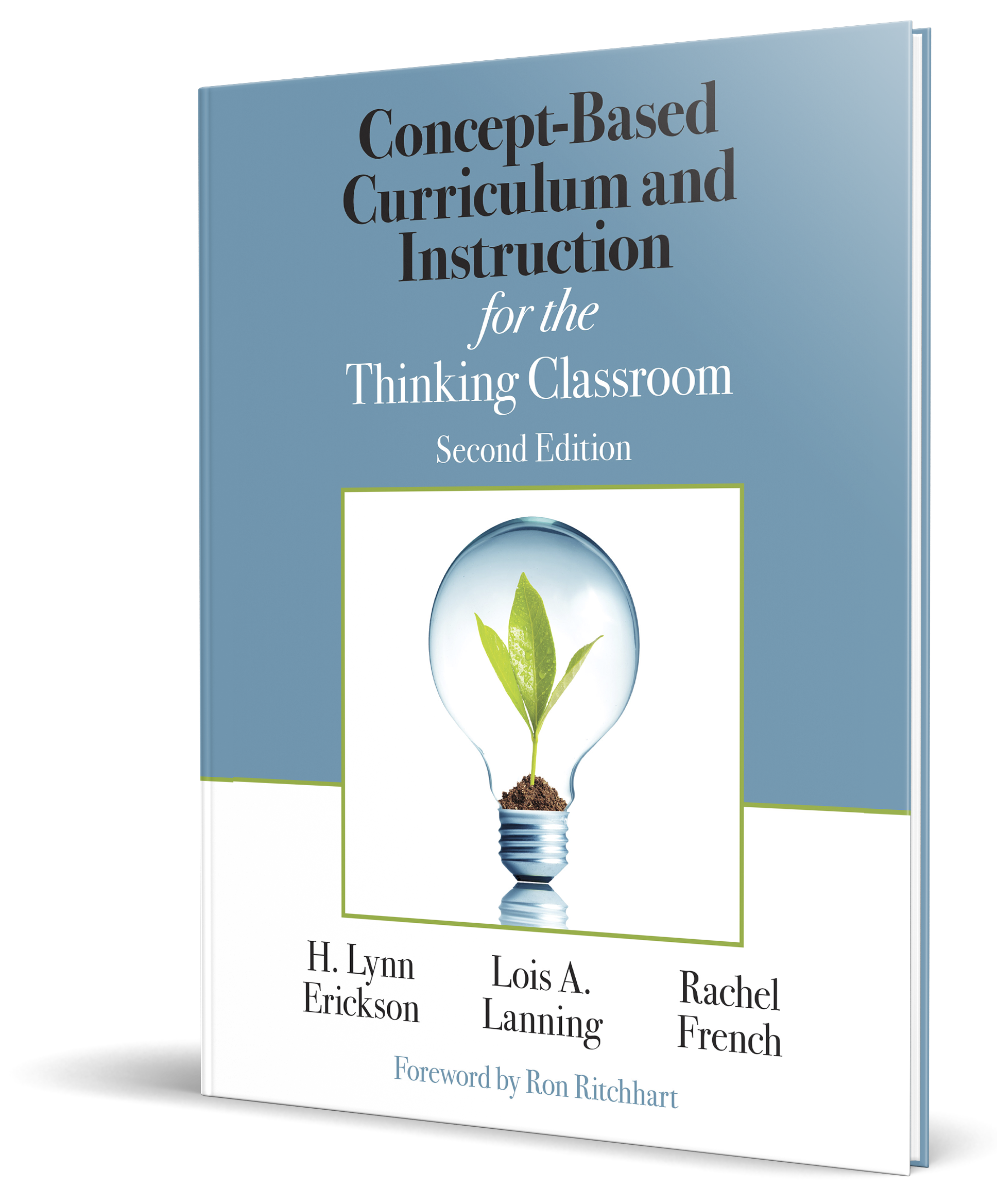BOOKS

Concept-Based Inquiry in Action
Strategies to Promote Transferable Understanding
Carla Marschall
Rachel French - Frankfurt International School (Oberusel, Germany)
Foreword by H. Lynn Erickson and Lois Lanning
From: All students deserve the opportunity to think conceptually. .... (to) realization of inquiry-based learning for understanding in any K–12 classroom.
DESCRIPTION
Concept-Based Inquiry in Action:
Strategies to Promote Transferable Understanding
All students deserve the opportunity to think conceptually. But seeing conceptual relationships does not come naturally to every student. How can teachers construct thinking classrooms where students can move from the factual to the conceptual level of thinking?
Concept-Based Inquiry in Action has the answers. In this book, the authors marry theory with practice to create a new framework for inquiry that promotes deep understanding: Concept-Based Inquiry. The key is helping students to inquire into concepts and the relationships between them using guiding questions developed by the teacher, the students themselves, or by the teacher and students together. Step by step, the authors lead both new and experienced educators to implement teaching strategies that support the realization of inquiry-based learning for understanding in any K–12 classroom.
The book and its accompanying website are rich with the resources necessary to facilitate the construction and transfer of conceptual understanding, including
- Numerous practical teaching strategies, aligned to each phase of Concept-Based Inquiry, that can be modified for diverse populations
- Visual notes that represent significant ideas discussed within each chapter
- Videos of instructional strategies and teacher interviews that show Concept-Based Inquiry in action in K–12 classrooms around the world
- Templates of graphic organizers, sample anchor charts, and blackline masters that support the use of teaching strategies in the classroom
- Planners that show how the phases of Concept-Based Inquiry come together in a unit
In a world filled with complexity, the role of the teacher as a facilitator of conceptual understanding has never been more pressing. Concept-Based Inquiry in Action provides teachers with the tools necessary to organize and focus student learning around concepts and conceptual relationships that support deep understanding.
REVIEWS
“For all its pedagogical purity, concept-based learning continues, no doubt, to perplex in practice. This book synchronizes concept and inquiry-based learning, demystifying the theories that underpin them and providing a wealth of practical classroom strategies that, ultimately, serves to deepen students’ conceptual understandings. This is exactly what my school needs right now to support colleagues to build on the foundations of our written concept-based curriculum and to take-off our taught curriculum to the next – and highest – levels.”
“I feel that this is a book that is timely and needed for a clearer picture of Concept-based Inquiry in action. This is a manuscript that educators would be able to pick up, understand, and apply into the classroom.”
“Filled with strategies, illustrations, diagrams, and pictures, this book really gives you the insight you need to help students better understand what they are learning. So many great ideas that can be used in any classroom. A must read for all educators.”
“It’s not every day that you read educational literature that you know will immediately have an impact on developing and improving your teaching practice. This book is like a guide that will lead you through the steps to becoming a better Concept-Based teacher. It is a book that teachers will take to planning meetings, have open, and refer to everyday. Just as a travel guide leads you too new discoveries this book will lead you to new discoveries with Concept-Based Inquiry. With this book you will see change and success in not only your teaching practice but also the understanding that the students will have in their learning.”
For all its pedagogical purity, concept-based learning continues, no doubt, to perplex in practice. This book synchronizes concept and inquiry-based learning, demystifying the theories that underpin them and providing a wealth of practical classroom strategies that, ultimately, serves to deepen students’ conceptual understandings. This is exactly what my school needs right now to support colleagues to build on the foundations of our written concept-based curriculum and to take-off our taught curriculum to the next – and highest – levels."
Neville Kirton
Deputy Head of Secondary
Colegio Anglo Colombiano, Bogota, Colombia

Concept-Based Curriculum and Instruction
for the Thinking Classroom
H. Lynn Erickson - Educational Consultant, Everett, WA
Lois A. Lanning - Educational Consultant, Connecticut
Rachel French - Frankfurt International School (Oberusel, Germany)
Foreword by Ron Ritchhart
DESCRIPTION
Think Beyond the Facts!
Knowing the facts is not enough. If we want students to develop intellectually, creatively problem-solve, and grapple with complexity, the key is in conceptual understanding. A Concept-Based curriculum recaptures students’ innate curiosity about the world and provides the thrilling feeling of engaging one’s mind.
This updated edition introduces the newest thought leadership in Concept-Based Curriculum and Instruction. Educators will learn how to:
- Meet the demands of rigorous academic standards
- Use the Structure of Knowledge and Process when designing disciplinary units
- Engage students in inquiry through inductive teaching
- Identify conceptual lenses and craft quality generalizations
Explore deeper levels of learning and become a Master Concept-Based Teacher.
REVIEWS
“This book is smart, and wise, and energizing. It honors the disciplines we teach by reminding us of their inherent meaning, rather than allowing us to accept them as collections of data. It honors teachers with the belief that they grow as human beings through understanding the power of what they teach and crafting approaches for sharing that power with young learners. It honors students by expecting them to become thinkers capable of reasoned stewardship of the world they live in and will inherit. It maps out a path for achieving the twin goals of content understanding and developing thinking—both too long absent in too many schools.”
“This revised edition is essential for all educators! If you want to help students deal with the overwhelming rate of complexity and information overload they face, look no further. This practical guide will help you design units for deep learning that lasts.”
“This new, updated edition of Erickson’s Concept-Based Curriculum and Instruction for the Thinking Classroom provides deep insights on how to create a thinking classroom by developing intellect and preparing our students for the 21st Century. This is a research-based, practical guide to designing curriculum and instruction that focuses on conceptual understandings through utilizing an inquiry-based approach. This book is bursting with examples and systematic strategies to engage and motivate our students. A must read for all 21st century educators!”
“The authors are justly intent on advancing the intellect of our students and ensuring schools are places that shape lifelong learners. The Concept-Based approach challenges teachers to think deeply about what and how they are teaching so that students deepen their understanding and retain and apply what they’ve learned. One of the greatest challenges any teacher faces is the transfer of agency from the teacher to the student. Concept-Based Curriculum and Instruction does just that. If we are serious about promoting engaged, motivated, productive, creative citizens, our teacher preparation institutions must provide in-depth guidance in this powerful design process. It is imperative that pre-service teachers understand “how knowledge and processes are structured and the relationship of these structures to teaching, learning, and intellectual development.” I know of no better resource to guide pre-service teachers in the development of thinking students than this text and others by these authors.”
“Teachers must be able to engage and motivate learners before they can teach them. However, engagement and motivation only come when learning is relevant and intrinsically interesting. For learning to be relevant and intrinsically interesting, teachers must start by crafting deeper conceptual understandings of personal or transferable significance. Given the pressures of a coverage curriculum, developing students’ critical, creative and conceptual minds is one of the biggest challenges our teachers face today. This brilliant piece of work by Lynn, Lois, and Rachel is what teachers need to address the challenge. The authors have beautifully presented a broad range of theoretically grounded and highly practical strategies to improve student engagement, thinking, and motivation through the principles of Concept-Based Curriculum and Instruction.”
“What should students know in an age of search engines? As factual and procedural knowledge are a click away, education needs to foster contextualization and higher order thinking through a focus on transferable conceptual understandings. This should be the Holy Grail of a modern education, which needs to crisply redefine what type of content matter is most needed so as to reserve time and space for deeper learning to occur. This essential book translates the needed sophistication of concept-based learning into actionable classroom practices, which every teacher will be enchanted to have.”
“A must read for all teacher credentialing programs. A valuable teacher’s guide on creating deep, passionate concept-based units of inquiry. This book artfully engages the reader’s thinking and takes them through a journey merging best practices in teaching and learning with brain based pedagogy. Once again, the authors explicitly demonstrate why Concept-Based teaching and learning is essential for all 21st century learners.”
“The 2nd edition of Concept-Based Curriculum and Instruction effectively brings together Erickson’s Structure of Knowledge and Lanning’s Structure of Process to present a coherent vision for Concept-Based teaching and learning across the disciplines. The enhanced focus on inquiry reiterates the importance of giving children the opportunity to form their own conceptual understandings inductively. I recommend this book to anyone interested in getting to the heart of Concept-Based Curriculum and Instruction!”
“This book provides support for educators implementing a concept-based curriculum. The practical planning steps and concrete examples for a range of grade levels provide an invaluable guide for those who aspire to make learning powerful. The book does not shy away from the reality of what a challenging journey the transition to a concept-based curriculum will be; rather it embraces the challenge as part of the joy of learning.”
“Concept-Based Curriculum and Instruction for the Thinking Classroom starts with a brief introduction on how our brains work and why it is important to look at each unit of study with a conceptual focus. The authors discuss the difference between inductive and deductive instruction and also show us how structured versus guided inquiry differ. There are lesson templates, examples of lessons, checklists, and even most frequently asked questions to guide us in continuing our challenging but rewarding journey into concept-based teaching.”
This book provides support for educators implementing a concept-based curriculum. The practical planning steps and concrete examples for a range of grade levels provide an invaluable guide for those who aspire to make learning powerful. The book does not shy away from the reality of what a challenging journey the transition to a concept-based curriculum will be; rather it embraces the challenge as part of the joy of learning.
Caroline Joslin-Callahan
Primary School Principal
